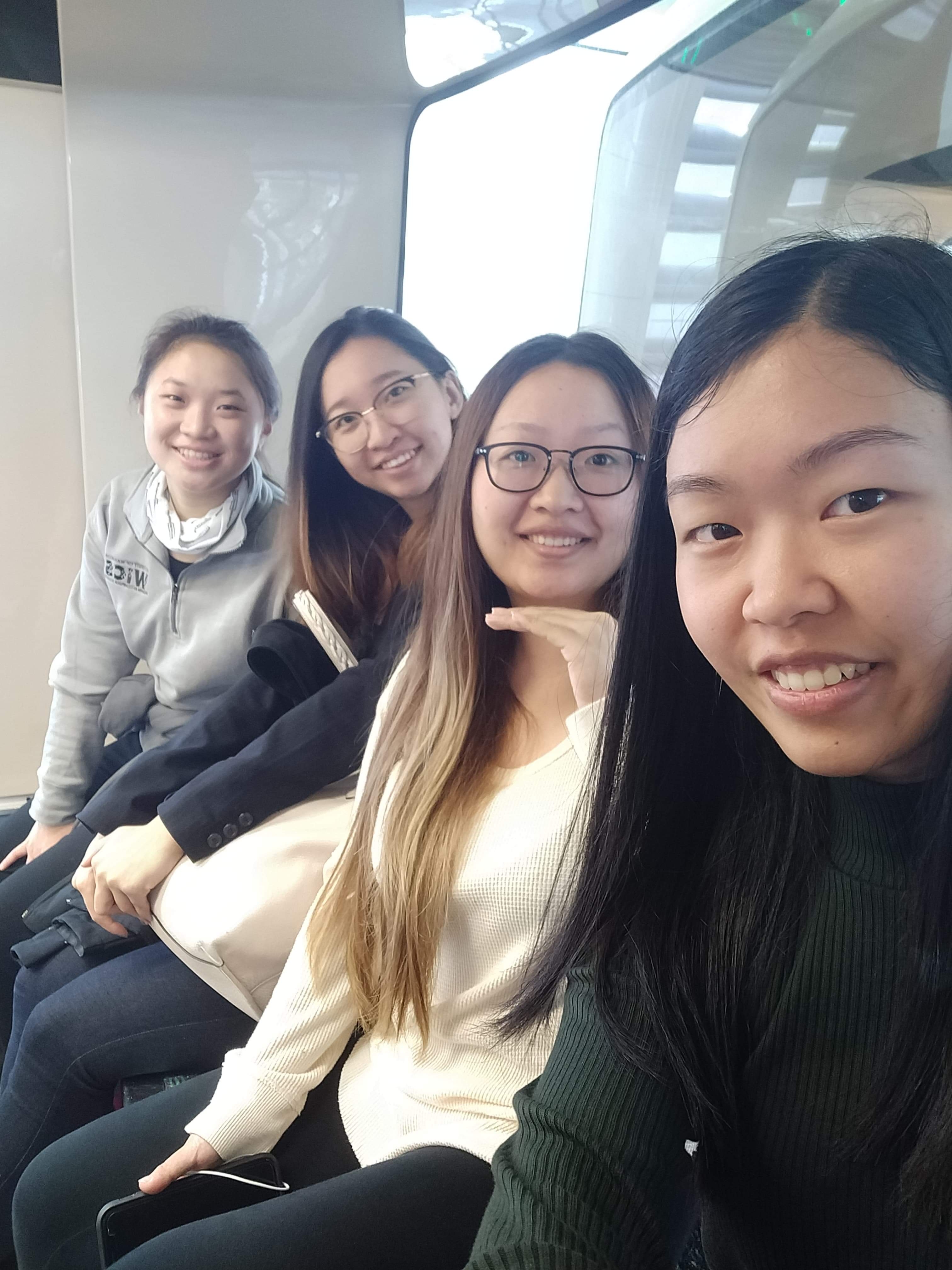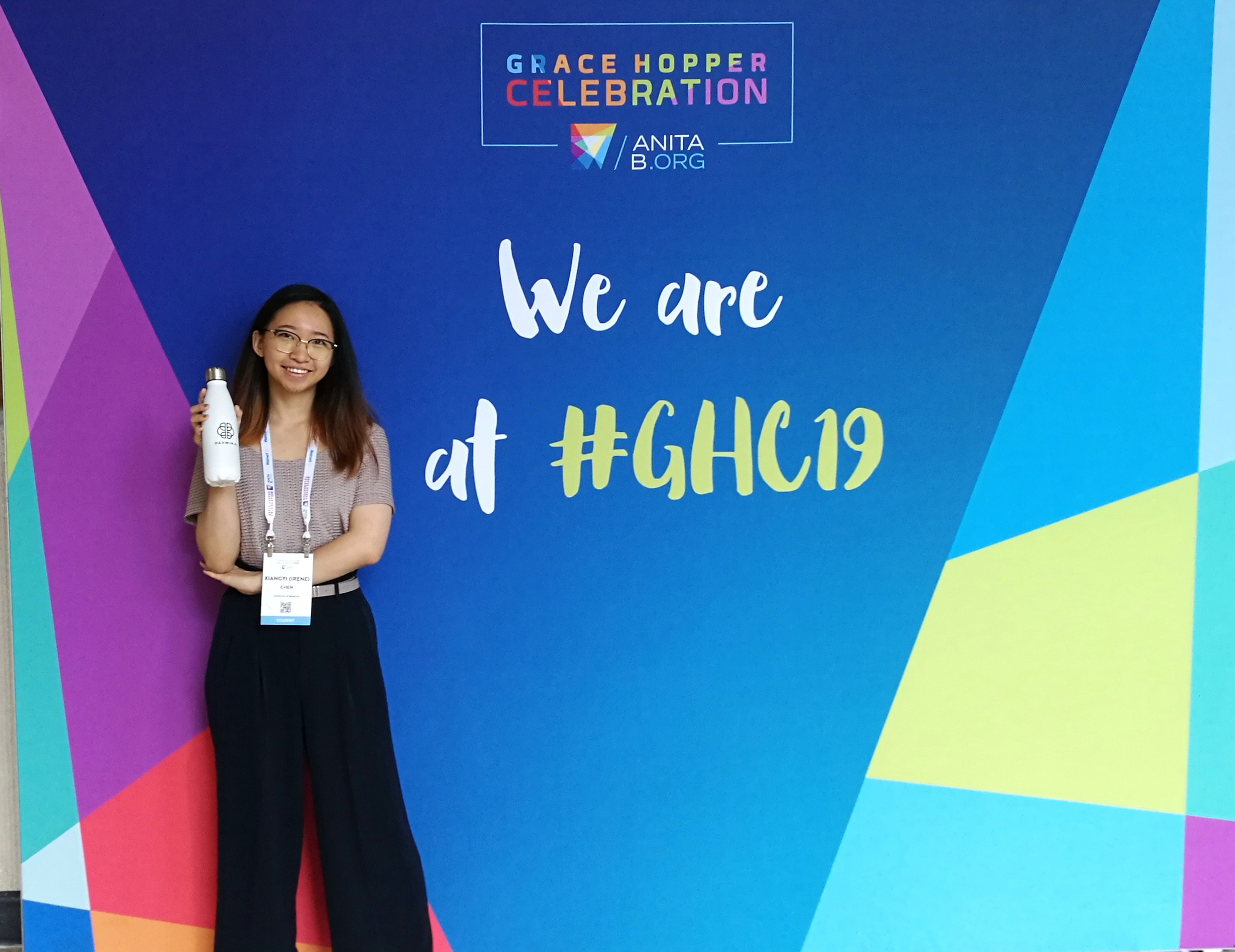Previous act: super late bird reaches the legacy conference.
==
Sometime back in late July or early August of 2019, I applied to be sponsored by my school’s WiCS club to attend the Grace Hopper Celebration. The conference this year was held at the Florida Orange County Convention Center, with a total of 200,000 attendees.
Now, around 4 months later, I can happily say that everything turned out better than I’d hoped for. I admit that this post is late, and the tone may sound a little to preachy to my liking. However, I felt that there’s value in documenting my thoughts, experiences and takeaways.
Feel free to reach out to me if you’re interested in chatting further!
pre-ghc: on being prepared
Let’s start with what I did in preparation to attend GHC. My objective for GHC was to first and foremost connect with employers for a summer internship opportunity.
timeline
Around August, I got friends and upper years to review my resume, which was later uploaded on the AnitaB.org resume bank around mid-September. If you’re familiar with their system, I initially uploaded it as a scanned pdf file, with mediocre success. Then to slightly improve on formatting, decided to re-“build” it on their website, which worked marginally better despite being uploaded later. However, this is anecdotal, and I’m unsure as to what employers see.
Then comes letting recruiters know: by responding to emailed event invitations, updating my LinkedIn, and reaching out to recruiters with LinkedIn activity related to GHC. The majority of my in-person opportunities were arranged using these methods.
Look through the list of sponsor companies, get to know some of the ones that you’re interested in, so that you can strike up more memorable conversations when you get to the Career Fair in person.
Finally, don’t forget to pre-register for events of interest to skip the line before the session. Even so, head over to those sessions around 20 mins earlier, since that’s about when they let people in.
items to bring
I printed about 50 physical copies of my resume, and ended out handing out around 30, and had a approx. 50% interview rate from that alone.
In terms of packing, bringing a clipboard and a half-empty suitcase was helpful, on top of the essentials such as your laptop, about 4-5 interchangeable outfits, sunscreen, walkable shoes, etc.
on being prepared
In retrospect, I’m thankful to my past self for being prepared, so that I could make the most of this conference as possible, from the job search aspect. But thinking back, I feel that I was lacking perspective and tunnel-visioned too much in the job search regard. The downside is not spending enough time gaining insights from the panels and talks. Perhaps next time I could strike a better balance, at the risk of not doing either well. What’s your ideal outcome?
There’s no immediate positive feedback to having your resume ready, being curious about technology and trying things out as personal projects, or grinding interview questions. But in the long run, luck is what happens when preparation meets opportunity.
ghc : sessions
There were very diverse talks, from academia, to industry applications, to navigating the workplace and professional development. The following are my brief notes on some of the talks I attended.
towards human-centered ai (by Dr. Fei-Fei Li)
The following messages throughout the talk resonated with me:
-
Remember that the machine values should represent human values. At the end of the day, technology should be human-focused—designed to enhance or help, not to replace human efforts. Hence, as an extension, technology should understand human emotions. This is important to define and keep in mind, especially at the young stage of applied AI in society. The potential of AI comes with many risks and pitfalls.
-
AI is multifaceted, and should be interdisciplinary. Engage with different industries and collaborate to better share domain knowledge and understand the problem and proposed solutions. Diverse perspectives can help us better foresee technology’s unintended consequences.
-
As engineers, researchers and people of technical background, it’s just as important to consider AI’s human and societal impacts. There’s a lot of need for technology to solve many important world issues, but we should be guiding its evolution in a human-centric way. But contrary to feeling like we’re limiting AI’s technical progress by being “safer”, we rather want to consider broader horizons and to understand the whole picture. AI should be inspired from cognitive sciences—for AI to be more thoughtful, collaborative, imaginative and human-centered.
The underlying message is clear: the concerns for AI are valid, and the wielders should care to be more cognizant of their repercussions.
Edit: the full talk has been recorded and published by AnitaB.org here.
the story of smart-compose: the gmail model that loved thanksgiving
This was a session on how to account for bias in products that we design and create, as well as the importance of testing each iteration of a product.
Anecdotal experiences about small tune-ups of models and reiterations of a product, to catch software mistakes that have impacts outside of just an engineering standpoint.
For example, inherent biases in the language used in the training data manifested themselves in the product. That needed to be corrected by diversifying message samples used to train the Gmail suggestion system, to more closely achieve inclusive design.
ghc: the job search
Regarding the job search, around the first day or two, recruiters still have empty on-site interview slot. By chatting at their booths at the GHC Career Fair, I scored a couple technical challenges and same-week interviews.
chatting at the career fair
As opposed to simply asking if they’re hiring, mention some of the things that you’ve heard about them, either regarding the company, the products, or even about what they’re looking for based on the open hiring positions you saw online.
It may be hard to keep in mind, if you’re starting out with less qualifications and discretion to choose, but keep in mind that the job search is a two-way street. Ask questions that you would want to ask in an interview, but don’t have the time or chance to ask.
For example, here are some of the things that I’m curious about that might also apply to you:
- (@Recruiter/Engineer) What’s unique at this company that you haven’t experienced elsewhere?
- (@Engineer) What’s the balance between support and maintenance, versus exploratory engineering work at X company?
- (@Engineer) What were some of your other options back when you were interviewing, and what made you choose X company?
post-ghc thoughts
Below are my main takeaways, ordered in no coherent fashion. It’s really just a brain dump of my thoughts at the time.
pond becomes lake, et al.
I’ve never felt as much of a medium-sized fish in a small pond as I did at GHC. There’s a mix of awe and humility to go from much smaller conferences to one with 20,000 attendees—who all happen to have similar enough, but different backgrounds as I do.
Every time that I think I’ve gotten used to my environment and current reality, I’m unexpectedly reminded about how vast the world is. It’s easy to become complacent and comfortable with where you currently are. Nevertheless, perhaps being content with your state in life isn’t inherently a bad thing: naturally, people are different and seek different purposes in life. But personally, I guess I draw a certain amount of satisfaction from trying to run as far as possible as a young adult and look back at my journey?
Tangentially, being in a pond means that it’s also difficult to see what other possibilities exist out there. Personally, I feel that meeting so many female PhDs and PhD candidates in the field of machine learning was very inspiring. Not that I didn’t know it was a possibility, but perhaps I never seriously considered doing grad school myself from some subconscious bias of not being “good enough”.
on the job search process
Attending GHC’s Career Fair has really opened my eyes about the lack of impact of applying through their online platforms. Directly talking to recruiters, team leads and engineers directly allows a short-circuit for the job search process.
As well, I’ve never really questioned the job search process until now. I appreciate how formulaic—for lack of better description—it is. Personal projects to demonstrate interest, your education and previous work experience to vouch that you’re not a risky hire, all which bring you towards a technical challenge filter. Then follows rounds of interview where the focus is more on what it’d be like to work as coworkers, and to understand your problem solving methodology when stumped by challenging problems. The latter can be practiced with friends and classmates. Trust me when I say, it does get easier.
As I make more progress in my career and grow to be more self-assured, if I get the opportunity to attend GHC in future years, I hope to focus less on the job search aspect and more on understanding the industry, society and broaden my perspectives.
self growth
In retrospect, I think what’s brought me this far is the following: let yourself take interest in things, be curious about the technology, but also the people. Ask questions to others, to search engines, but also to yourself. It not only helps in an engineering and technological sense, but also with conversations and connecting with people, as well as for self-growth and exploration of society.
On another note, this was also my first time traveling without close friends or family. I fortunately met a great group of people, and at the risk of sounding cheesy, the overall feeling of traveling “by yourself” felt really empowering.
Cheesy plane scenery:

New friends:

Shameless DarwinAI plug:

final words
Some words of advice from people I met:
- Be confident, don’t be hesitant to advocate for yourself.
- It’s not bragging if it’s true.
- Your achievements don’t speak for themselves (in the literal sense).
next ghc?
Maybe see you there?
I’m currently sinusoidally straying from Software Engineer TM, to wanting to be cited and publish papers, and back. I hope to one day be qualified enough to attend NeurIPS or something ahah :’)